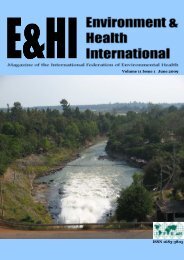IFEH ISSUE 6 - International Federation of Environmental Health
IFEH ISSUE 6 - International Federation of Environmental Health
IFEH ISSUE 6 - International Federation of Environmental Health
- No tags were found...
Create successful ePaper yourself
Turn your PDF publications into a flip-book with our unique Google optimized e-Paper software.
Africa Academy for <strong>Environmental</strong> <strong>Health</strong>:<br />
Past, Present and Future<br />
Grimason, A.M., Pr<strong>of</strong>essor <strong>of</strong> <strong>Environmental</strong> <strong>Health</strong>, Department <strong>of</strong> <strong>Environmental</strong> <strong>Health</strong>, University<br />
<strong>of</strong> Malawi.<br />
Engelbrecht, J.C., Principal Lecturer, Principal Lecturer in <strong>Environmental</strong> <strong>Health</strong>, Department <strong>of</strong><br />
<strong>Environmental</strong> <strong>Health</strong>, Tshwane University, South Africa.<br />
Contact: agrimason@poly.ac.mw<br />
“Success in tackling environmental health problems depends very much on collaboration between<br />
ministries and agencies. Members States, WHO and partners should work together to apply these tried<br />
and tested methods and knowledge to make the environment more healthy.” (African Regional <strong>Health</strong><br />
Report, 2006)<br />
“For millions <strong>of</strong> children today, particularly in Africa, the biggest health challenge is to survive until<br />
their fifth birthday, and their chances <strong>of</strong> doing so are less than they were a decade ago.” (Lee Jong-<br />
Wook, Director –General, World <strong>Health</strong> Organization, World <strong>Health</strong> Report 2003).<br />
Introduction.<br />
In Africa it is recognised that there is a shortage <strong>of</strong> <strong>Environmental</strong> <strong>Health</strong> Practitioners (EHPs) per<br />
head <strong>of</strong> population and national policies are currently directed at addressing this problem. A review <strong>of</strong><br />
environmental health education in six African countries (Angola, Botswana, Cameroon, Kenya, Mali<br />
and Zambia) by the Africa Region <strong>of</strong> the WHO (2005) reported that few countries <strong>of</strong>fered<br />
environmental health courses. Only Kenya had an adequate number <strong>of</strong> environmental health degree<br />
programmes in place producing the requisite number <strong>of</strong> graduates required for the size <strong>of</strong> the country.<br />
In the other five countries the approach to environmental health education and enforcement was<br />
fragmented and only specific areas covered through allied pr<strong>of</strong>essionals (i.e. nurses, doctors) e.g.<br />
health education, community health or as a module in a Masters in Public <strong>Health</strong> course. It concluded<br />
that a more holistic and co-ordinated approach to environmental health practice was needed and that<br />
the academic sector could address this problem through the provision <strong>of</strong> appropriate courses but that at<br />
present this sector is under-utilised.<br />
Even where degree programmes do exist concern has been expressed that the curriculum for training<br />
EHPs (in West Africa) lagged behind the skills required to cope with the challenge <strong>of</strong> environmental<br />
monitoring and control (Emeharole, 1993). Emeharole reviewed the existing curriculum for the<br />
training <strong>of</strong> EHPs at the diploma and degree levels in the sub-region and concluded that both curricula<br />
lack sufficient credit weight to impart the desired skills to perform the highly scientific task <strong>of</strong><br />
environmental monitoring, which is a problem we envisage exists in other African countries. The lack<br />
<strong>of</strong> appropriately qualified pr<strong>of</strong>essionals in this area inevitably leads to inadequate environmental<br />
health practice and enforcement, inappropriate environmental health policy and strategy for action, the<br />
lack <strong>of</strong> sound information for priority setting and planning, the absence <strong>of</strong> a suitable set <strong>of</strong><br />
environment and health indicators, and the lack <strong>of</strong> an appropriate performance indicator system<br />
(Emeharole 1993; WHO 1998; Thomas et. al, 2002; Cairncross et. al., 2003; WHO 2005).<br />
40



